Skyttegravenes zoner af meningsintensitet - Karl Ove Knausgårds eksistentielle læsning af første verdenskrig
DOI:
https://doi.org/10.7146/sl.v0i70.104415Keywords:
Existential reading, 1914, World War I, poetics, dialecticsAbstract
This article investigates how the Norwegian author Karl Ove Knausgård in My struggle (2009-2011) uses his existential reading of 1914 and World War I to nuance our general understanding of the war. Knausgård wants to demonstrate that the collective enthusiasm, which took millions of men by storm, was existentially motivated. The war was able to give the soldiers a sense of meaning, a project and a community; feelings they needed in their civilian lives. Furthermore, Knausgård uses his reading of World War I to make a connection between the soldier’s fight and his own struggle. On the basis of his existential reading of World War I, Knausgård is able to formulate a literary poetics and existential experience. Therefore, Knausgård is able to actualize World War I.Downloads
Published
2018-03-09
How to Cite
Elbæk, C. K. (2018). Skyttegravenes zoner af meningsintensitet - Karl Ove Knausgårds eksistentielle læsning af første verdenskrig. Slagmark - Tidsskrift for idéhistorie, (70), 111–125. https://doi.org/10.7146/sl.v0i70.104415
Issue
Section
Tema





